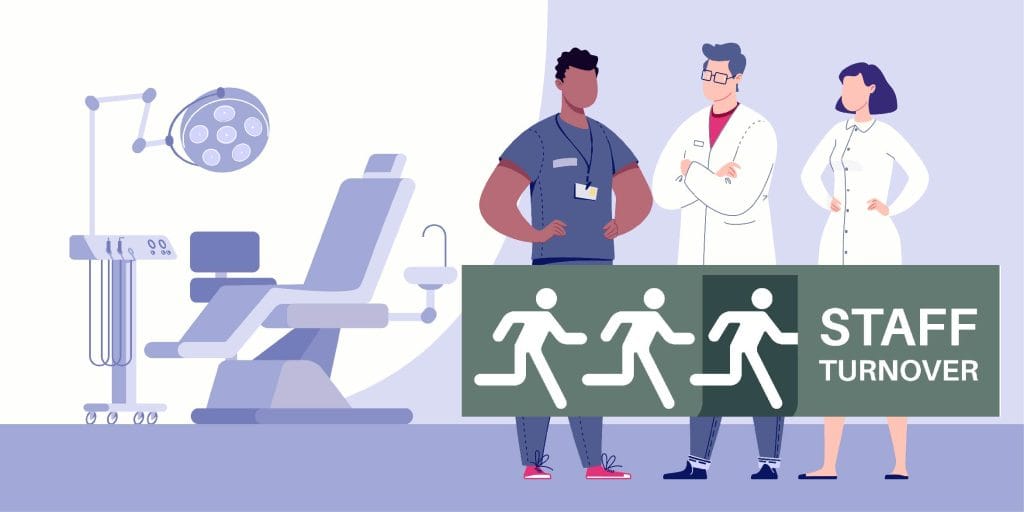 Q: My staff constantly interrupt me during patient hours with random questions. What should I do?
Q: My staff constantly interrupt me during patient hours with random questions. What should I do?
A: Good question and one I hear more than you’d expect. And the word “random” you chose fits! The questions can be anything from:
- What do you think we should order this week?”
- “I’m done with the confirmations for tomorrow. What should I do now?”
- “Insurance didn’t cover X amount for Joe, what do you want me to do?”
- “I don’t know how to do X in our software…?”
To:
- “When do you want this lab case back?”
- “Is this material the same as this one?”
- “Three of Suzy’s (the hygienist) patients canceled for tomorrow. Just letting you know…”
A big challenge in dentistry is that the business owner is typically the primary producer—or one of the primary producers/revenue generators for the business. They have the responsibility of running the practice, supervising the business/administrative side of things and performing dentistry. So, while these business processes are needful, any time the doctor is not chairside the practice is potentially missing out on revenue. So, it’s an interesting balance.
Much of this challenge can be solved by having an effective Office Manager and setting aside time for administrative/business duties. Ideally, you want 100% of your focus on patients during chairside hours.
(Related: Staff Conflict? What Can You Do?)
But what if you’re constantly interrupted by members of your team with questions during this production time?
Even if it only takes 30 seconds to answer a quick question, between that and all of the potential hecticness involved with a dental schedule (gloving, degloving, sitting the patient back, switching ops, doing exams, coordinating with the assistant, presenting treatment, patients asking questions, etc.), these little distractions add up and can throw a wrench into your day. It can ruin your focus. Or, if it’s bad, make you want to tear your hair out eventually.
And worse, this can insidiously impact your production over time and with an inevitably negative effect on your numbers.
WHY does this continue to happen?
 The answer usually is not that your staff are lazy or unintelligent. Complaining about the staff doesn’t solve anything. Ultimately, it derives from how you, as the executive in charge of the office, have organized the practice and the work environment. And with that in mind, there is usually one of six specific reasons that cause your staff to regularly interrupt you with “random” questions:
The answer usually is not that your staff are lazy or unintelligent. Complaining about the staff doesn’t solve anything. Ultimately, it derives from how you, as the executive in charge of the office, have organized the practice and the work environment. And with that in mind, there is usually one of six specific reasons that cause your staff to regularly interrupt you with “random” questions:
- You have no (or not enough) clear-cut office policy on how things should be handled, and so the staff don’t know what to do.
- You do have policy, but your staff haven’t been trained on it.
- You don’t have manuals for each position in the office or training time for the staff to become proficient at their jobs.
- Your staff are afraid to make a decision and so they leave all the responsibility up to you.
- You’re keeping potentially non-performing staff in your office, instead of moving them to a different position or replacing them with someone that performs up to an acceptable level. Or,
- Your staff have somehow been given the impression that it’s “okay” to interrupt you during production time.
(Related: Dr. Winteregg’s Scheduling Policies – Part 1)
How to solve this
Some of the solutions are self-explanatory, but I have a few pieces of advice that can help you improve in this area:
1. Create clear-cut policy.
Policy isn’t just for billing or cancelation fees. You should create policy for specific procedures and scenarios in the office.
Things like:
- What to do when insurance compensation is lower than expected.
- When and how to order supplies and materials.
- How lab cases are handled and what the timeline should be.
- How the schedule should be designed – where primary or secondary procedures should go on the schedule, what times are blocked out for new patients and emergencies, etc.
- How to handle cancellations and steps that should be taken to fill open time.
- When recall cards should be sent out.
- Confirmation and reminder procedure.
- Etc, etc, etc.
Those are just a few examples. There are a ton of other policies that should be created for your office.
(Related: Reminder and Confirmation Procedures for Your Hygiene Department)
2. Assemble these policies into job manuals & set aside time for staff training.
 All that policy doesn’t do a lot of good if the staff don’t know it and have nothing written down to refer back to.
All that policy doesn’t do a lot of good if the staff don’t know it and have nothing written down to refer back to.
So, have them spend some time learning these policies and procedures and mastering the various aspects of their jobs. And when you’ve got it written down in a manual, when they have a question you can simply refer them back to the policy and then they won’t have to come back to you next time it comes up.
And beyond the policy, it’s always good to have continued staff training. Just like you, as a doctor, do continuing education and continue to sharpen your skills every year, the staff should also be continuing to learn and sharpen their skills.
We’ve made this easy for you with our online training platform, DDS Success. This includes thorough video training on front office systems, including all the nitty-gritty details on scheduling, billing, making financial arrangements, answering the phones, etc., as well as extensive learning materials on how to have great customer service, communication, phone skills, organization, and more. Schedule a free demo here. It even includes example policies, procedures, checklists and forms to help you start crafting your own manuals.
3. Set aside times for meetings and coordination with the team.
I don’t want this article to come across like your staff should never talk to you and they should just figure everything out on their own.
Of course, you should be approachable and there should be open communication between you and the staff. It’s just that your time is a little more limited during production hours.
So I recommend setting a few times in stone every week for meetings. This article by Dr. Greg Winteregg lays out exactly what those meetings should be.
Essentially, you’ll want to have a quick morning huddle to start each day to coordinate how patients will be handled that day, a weekly staff meeting with the whole team where issues and questions and be brought up, and a weekly meeting with your Office Manager to hammer out some planning, administrative issues and logistics.
4. Have an Office Manager that is a real executive.
 As I mentioned earlier, managing a business while also being chairside most of the day is quite a challenge. It can’t be done alone. You need an effective Office Manager.
As I mentioned earlier, managing a business while also being chairside most of the day is quite a challenge. It can’t be done alone. You need an effective Office Manager.
I am a big supporter of having an Office Manager that is an executive—not a vague “front desk person.” Read this article and what an Office Manager is and why we strongly believe you need one in your office.
(Related: Hiring the Right Office Manager and Building a Productive Team)
Running the day-to-day operations, managing the staff, handling issues that come up throughout the day, training new employees, etc., is an important job on its own. In a larger office it is a full-time job. In a smaller office they may also be the Financial Coordinator or Scheduling Coordinator in addition to their Office Manager job – but they are still the Office Manager and the senior team member that oversees the other staff.
Having a highly competent Office Manager makes the doctor’s life so much easier and allows the practice to grow. That’s why when a dentist comes to MGE for training, we also train their Office Manager. A well-trained Office Manager can handle most things that crop up throughout the day themselves and ensure the staff understand and apply the office’s policies.
If you would like some help creating office policy and/or finding and training a great Office Manager, we can help. Schedule a free consultation with an MGE specialist here.
And if you have any questions, feel free to contact me at SabriB@mgeonline.com.
I hope this helps!




No Comments
Be the first to start a conversation